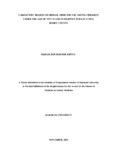CAREGIVERS’ BELIEFS ON HERBAL MEDICINE USE AMONG CHILDREN UNDER THE AGE OF FIVE YEARS IN SILIBWET SUB-LOCATION, BOMET COUNTY
Abstract
The Declarations of Alma Ata and Astana recognized traditional medicine as part of primary health care. About 80% of people in the world today depend on traditional medicine to meet their health needs, because they are considered easily accessible, safe, cost-effective, and culturally acceptable. For this reason, the World Health Organization has devised a strategy to help member states formulate policies for regulation of herbal medicine production, use and practice. Many countries, in response to the WHO strategy, have formulated policies, research centers, and training institutions for herbal practitioners. In Kenya, the Ministry of Health has developed policies for regulation and registration of herbal practitioners. However, the policies are yet to be implemented. As such, the practice of traditional medicine in Kenya is unregulated and the products sold could potentially pose harm to the population. Children are at the highest risk of harm because of their developing body systems which are susceptible to toxicity. Since literature has shown that beliefs influence behavior, this study aims to explore caregivers’ beliefs on herbal medicine use among children under the age of five in Silibwet Sub-Location, Bomet County. This was a qualitative phenomenological study that was done in Silibwet sub location. Purposive sampling was used to select caregivers 10 parents and guardians for in depth interviews and 15 community health workers for the focused group discussions. Snowball sampling was used to select 6 key informants. A researcher-administered semi-structured interview guide was used to collect data. Thematic data analysis was used. The study found that over 90% of caregivers used herbal medicines on their children for protection from evil eyes and for promotion of growth. Others used them for treatment of cultural, common and chronic illnesses and for cleansing. They considered herbal medicine safe, cheap and easily available

